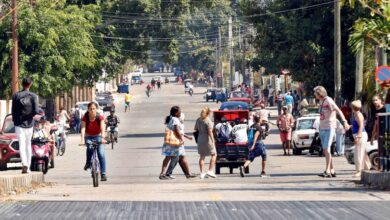Prevention is the solution to the health crisis in Latin America
What if instead of looking to cure the disease we seek to prevent it?

This is the situation: there are people who believe that because they do not feel bad or do not perceive anything strange in their bodies means that they are healthy. As a result, they do not prioritize their health until it is too late. There are also those who do not like to go to the doctor, either because they do not believe in the system or because they fear diagnosis. Finally, there are people who simply do not go because they do not have money to cover their health.
Leer en español: La prevención es la solución a la crisis de la salud en América Latina
But the figures speak for themselves and we can not ignore them. In a report of the World Health Organization (WHO) of 2017, it is explained that noncommunicable diseases or NCDs "takes the lives of 15 million men and women between 30 and 70 years old every year". No country is exempt.
In the Americas, NCDs "are responsible for 80% (5.2 million) of total deaths." 35% of deaths caused by the four major NCDs occur prematurely in people aged 30-70 years", reports the Pan American Health Organization (PAHO). The four noncommunicable diseases are cardiovascular and chronic respiratory diseases, cancer and diabetes.
Now, if we add to this the communicable diseases, the mortality figures increase in some countries of the region more than in others. These communicable diseases are: "Infection by HIV / AIDS, sexually transmitted infections (STIs), and viral hepatitis, tuberculosis, vector-borne diseases, neglected tropical and zoonotic diseases, and diseases preventable by vaccination".
Undoubtedly, thanks to advances in health and technology, life expectancy has increased considerably in Latin America and the Caribbean, as well as in the world. In addition, today we can address many of these diseases, both communicable and non-communicable, as a result of this progress.
But what if instead of seeking to cure the disease we seek to prevent it? What if instead of encouraging to go to the doctor when we feel bad or when the disease is at an advanced stage, we better educate people to go at least once a year to consult with the doctor as a precautionary measure? How about doing medical exams not because we have, but as a routine to prevent diseases or detect them in time?
Read also: Macri did not help overcome the crisis in argentina, he deepened it
In LatinAmerican Post we believe that the States should invest in health programs focused not only on the treatment of diseases for their cure but on the prevention of these. Both for those diseases that leave a high mortality rate in the region and for others such as hypertension. And even problems such as excessive consumption of tobacco and alcohol, as well as mental illness.
According to the WHO, "most premature deaths due to NCDs can be prevented or delayed by applying a set of" best investments "and other interventions to prevent and control such conditions, mainly cardiovascular diseases, and chronic respiratory diseases, cancer, and diabetes. "
This also applies to communicable diseases. According to PAHO, one of the objectives of the Member States is to "prevent, control, treat and eliminate these diseases." Of course, this is something that the health sector can not achieve alone, but must be accompanied by the support of "other sectors, such as education, water, and sanitation and labor".
However, Carissa F. Etienne, director of the Pan American Health Organization, affirms that the advances that have been made only in the prevention of noncommunicable diseases are still inadequate. For her, these advances "depend on political commitment, in particular on national governments working in a multisectoral way to put people's health first, before politics, profits and personal promotion".
The problem is that in Latin America and the Caribbean, prevention is not a business for governments. Prevention does not leave money, so the medicine of the region is more focused on curing than on preventing. As Etienne mentioned well, there are interests from the governments that prevent the region from advancing in the objectives to reach the 2030 Agenda for Sustainable Development.
Read also: Follow these 5 tips to lower your blood pressure
"Industry interference, as well as commercial and economic interests, have impeded the implementation of pro-health fiscal and regulatory policies," he says. Thus, if efforts are being made in the region and programs are being created that promote prevention and invite a healthier lifestyle, it is still not enough.
Cuba is one of the countries of the subcontinent committed to the prevention of these diseases, aware of the importance of this. In fact, WHO and PAHO have repeatedly congratulated the work of the Caribbean country in the prevention of communicable and noncommunicable diseases.
In addition, according to the WHO report, many countries in the Americas have made progress by creating policies to control or restrict alcohol and tobacco, and even reduction of sodium and fatty acids. This with the aim of promoting a better lifestyle and thus improve health in these countries.
In fact, the prevention, control, and treatment of these diseases are one of the objectives of the Pan American Health Organization in its Agenda for Sustainable Health for the Americas 2018-2030. This is a "response of the health sector to the commitments assumed by the Member States of PAHO in the 2030 Agenda for Sustainable Development". It has 10 objectives, two of which talk about these problems. Even one of the objectives is access to health services.
However, this is something that must also go hand in hand with the awareness of people, who for Anselm Hennis of the Department of Noncommunicable Diseases and Mental Health, should participate in the solutions.
Let's get involved, participate and above all, do not wait until the last moment to go to the doctor or to start having a much healthier lifestyle. It could be too late.
LatinAmerican Post | Editorial Team
Translated from "La prevención es la solución a la crisis de salud en América Latina"
Listen this article





